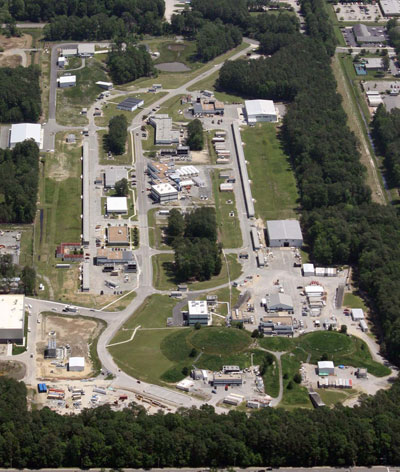
NEWPORT NEWS, Va. - A committee appointed by the U.S. Department of Energy and National Science Foundation to review and recommend the future course of nuclear physics research in the United States has issued a report supporting the continued funding of the experimental program at the U.S. Department of Energy's Jefferson Lab.
The Nuclear Science Advisory Committee, which provides advice to the DOE and NSF on the nation's program for basic nuclear science research, considered the future of all research programs funded by the agencies under three funding scenarios, a modest-growth and two no-growth federal budgets. NSAC, in turn, appointed a special subcommittee of scientists to review the programs, which include the three largest nuclear science research programs - the Continuous Electron Beam Accelerator Facility (CEBAF) located at Jefferson Lab, the Relativistic Heavy Ion Collider (RHIC) at Brookhaven National Laboratory and the future Facility for Rare Isotope Beams (FRIB) at Michigan State University.
The committee's leading recommendation concerned a modest-growth budget: "The future science potential was a major ingredient in the subcommittee's assessment of how the budget scenario would impact the field. Of the options considered, the subcommittee was unanimous in endorsing the modest-growth budget scenario as the minimum level of support that is needed to maintain a viable long-term U.S. nuclear science program that encompasses the vision of the LRP (Long Range Plan)."
The Long Range Plan for nuclear physics research was developed by NSAC in 2007. In that plan, completion of the 12 GeV Upgrade at Jefferson Lab was the first of four recommendations. Construction on the 12 GeV Upgrade to expand the research capabilities of Jefferson Lab began in 2009.
The committee noted this effort in discussing no-growth situations: "In developing this report, the subcommittee has considered the impact on the U.S. nuclear science program under three different budget scenarios. Two of them provide no growth. The third would provide modest growth. The recommendations that were made for these different scenarios must be viewed as a snapshot in time that reflects the state of the field today. This view led the subcommittee to conclude that under all scenarios we must capitalize on the investment that has been made to upgrade CEBAF."
The committee further stated that under a no-growth budget, either RHIC or FRIB implementation would have to shut down. RHIC is an existing facility, while FRIB is yet to be constructed.
"Because of the superb science lost in either shutting down RHIC or terminating construction on FRIB, the committee was not able to make a choice based on scientific merit alone. Based on additional considerations of timing of the budget crisis relative to the status of the ongoing construction initiative, the subcommittee vote, while closely split, resulted in a slight preference for the choice that proceeds with FRIB," the report says.
Jefferson Lab Director Hugh Montgomery noted that the committee was faced with a difficult task. He said that any cuts in funds will harm all U.S. research facilities, while jeopardizing U.S. leadership in nuclear physics research and slowing future advances the field will make in understanding the complex nature of our universe. He noted further that reduced funding will adversely impact regional economies and, importantly, limit training and educational opportunities for future scientists, engineers and science-related specialties. Montgomery said he will work with the directors of RHIC at Brookhaven National Lab and of the FRIB project at Michigan State University to seek congressional support for a modest-growth budget, which would provide a 1.6 percent increase, or roughly $50 million more in Fiscal Year 2014, to keep all three programs operational.
"Our national research labs have made many important contributions, from developing new technologies and new energy sources to enhancing national security and improving our health and well being," Montgomery said. "Cuts in the budget send a wrong message, telling the next generation of scientists from around the world who use our facilities and who are engaged in the basic sciences, particularly in discovering the fundamental nature of nuclear matter, that they might do better to look elsewhere to conduct their research."
In its report, the committee stated: "It is difficult to forecast the future impact of a field like nuclear science whose goal is to understand the origin, evolution, and structure of visible matter in the universe. However, history shows that breakthroughs in technology nearly always have come either from science discoveries that ‘had no apparent application’ or from developing the tools that were needed to make the discoveries."
Contact: Deb Magaldi, Jefferson Lab Public Affairs, 757-269-5102, magaldi@jlab.org

